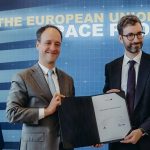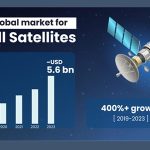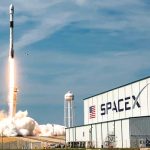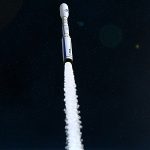Developed by the European Space Agency, the IXV marks the latest step by Europe in the development of atmospheric re-entry technologies
 Vega, the latest member of the family of launchers operated by Arianespace, has successfully launched the IXV (Intermediate eXperimental Vehicle) atmospheric reentry demonstrator. The fourth Vega launch took place on February 11 from the Guiana Space Center in French Guiana.
Vega, the latest member of the family of launchers operated by Arianespace, has successfully launched the IXV (Intermediate eXperimental Vehicle) atmospheric reentry demonstrator. The fourth Vega launch took place on February 11 from the Guiana Space Center in French Guiana.
Developed by the European Space Agency, the IXV marks the latest step by Europe in the development of atmospheric reentry technologies, a key to manned flights. These technologies are essential not only for future reusable launchers, but also for the return to Earth of samples or astronauts after voyaging in space.
The IXV program supports the development of an autonomous, guided European atmospheric reentry system, as well as validating in flight its aerodynamic performance and overall design, especially its thermal protection system.
IXV was designed and built by Thales Alenia Space Italy in Turin. The Vega light launcher used for this mission is built by the prime contractor ELV, a company jointly owned by Avio (70%) and the Italian space agency ASI (30%). In other words, this mission is a two-pronged success for the Italian space industry, spotlighting its technological excellence and overall expertise in space transport.
The orbital parameters confirmed by ESA and Arianespace are perfectly conformed as predicted.
As of February 11, 2015, Arianespace has 10 Vega launches in its order book, with 12 launchers under production. Following this launch, two more Vega missions are scheduled this year, one for the European Commission, as part of the Copernicus program (Sentinel-2A), and the other for ESA (Lisa Pathfinder). 2015 is a pivotal year for Vega, with the annual launch rate rising from one to three.
The fourth Vega launch is part of a series of three ESA missions designed to demonstrate the launcher’s versatility, while also opening its flight envelope. After the Proba-V Earth observation satellite, injected into Sun-synchronous orbit on the second Vega launch, and IXV, injected into a ballistic trajectory for a demonstration mission on the fourth launch, this coming autumn Lisa Pathfinder will be sent towards the Lagrange L1 point for a scientific mission on the sixth Vega mission.
Shortly after the announcement of the successful separation of IXV, Arianespace Chairman and CEO Stéphane Israël said: “On behalf of Arianespace, I am delighted to see the success of our fourth Vega launch. Vega has confirmed its position as the benchmark in its market segment, also reflected in our recent business wins. I would like to thank Vega prime contractor ELV and its shareholders, Avio and the Italian space agency, for their remarkable contribution to the success of the European space transport industry and its state-of-the-art technologies. I would also like to thank ESA, both customer and operator for this launch, for their ongoing support for our business. Congratulations to everybody at TAS for their expertise in atmospheric reentry technologies, clearly proven by this mission. And of course, thanks to our partners at CNES-CSG, to all staff at the launch base, and to the men and women of Arianespace for the success of our first mission this year.”













































































